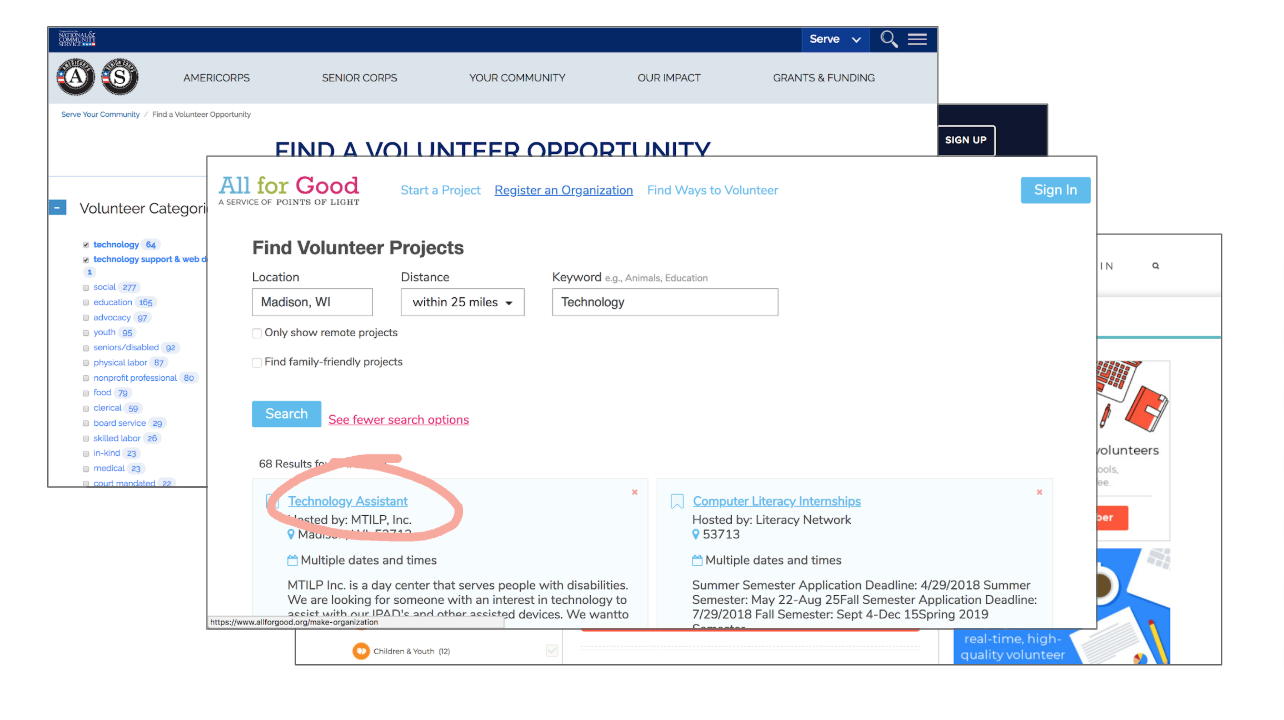Tech & Social Impact: What kind of volunteering is right for me?
 This is the second in a series of posts about how folks who work in tech can be superheroes of social impact in their own backyards - wherever that might be, no matter how busy they are, and no matter their specific skills.
This is the second in a series of posts about how folks who work in tech can be superheroes of social impact in their own backyards - wherever that might be, no matter how busy they are, and no matter their specific skills.
The first piece examined why we should volunteer; now, we'll look at how to choose the right kind of volunteering.
So you've decided to want to volunteer more. That's awesome!
Given the vast array of opportunities, it might seem like getting started is the easy part - when there are so many available roles at so many different organizations, can't we just buffet our way around until we find something we like?
On the contrary: I'd argue that before you do anything else, it's crucial to take the time to evaluate and plan, because burnout is real, and you don't want to waste your time (or the organization's).
Luckily, folks have researched how to combat volunteer burnout, and their findings are pretty straightforward:
- Don't overcommit
- Focus your efforts
- Be wary of treating volunteering like an "escape"
And finally, the organization itself for which you're volunteering has a big impact.
Management practices of the organization (e.g., reinforcement, ways of contact, selection, training, supervision of volunteers) significantly explained variability on satisfaction, commitment, and continuance.
Prediction of Burnout in Volunteers
Below, we'll look at three ways to help you narrow your options to those that are the best fit for you.
1. Do your homework

Unsure which kinds of organizations might be a good fit? Think about what you value: is it tech literacy? Access to food? Racial justice?
Dr. Pilar Moreno-Jiménez and Dr. M. Carmen Hidalgo with the University of Malaga found that "volunteers who are intrinsically motivated" to help an organization (ie: have shared values) are less likely to experience burnout (source).
So if you're not interested in working with children, it doesn't really matter how much your neighbor wants you to help out at your synagogue's daycare; it's unlikely to greatly benefit you OR the congregation in the long-term.
That example ties into another of Dr. Moreno-Jiménez and Dr. Hidalgo's findings (emphasis added):
When one of the motivations to become a volunteer is social pressure from family and friends, the volunteer is not completely convinced of his or her involvement in volunteering, [which facilitates] the appearance of burnout and finding the task more exhausting and less interesting.
Prediction of Burnout in Volunteers
However, if you're an avid gardener, you could check out local conservation groups, capitalizing on your and the organization's shared values.
Another way to find a place to volunteer? Follow the money! If you currently donate or have donated in the past to any causes or organizations, those are excellent places to start.
2. Define your goals
 There are any number of reasons folks might be interested in volunteering; we'll be looking at three main ones.
There are any number of reasons folks might be interested in volunteering; we'll be looking at three main ones.
Meet new people
Did you recently move to town, and are looking to make connections? Trying to expand your network beyond your job and family?
Look for volunteer opportunities that involve groups (like volunteering at a university hackathon) or repeatable, consistent volunteer gigs that let you get to know people over a period of time.
Gain experience with a particular demographic
Not having children of my own - and with few parent friends - I'm not great at interacting with "the youths" (ie: 8 years old to 18 years old), which was especially apparent when I spent a spring assisting with a local after-school coding program.
After teaching middle-school students how to write basic HTML and CSS for a few months, I became measurably less awkward and more comfortable around them; it was a nice bonus to an already enjoyable volunteering gig.
Learn a new skill
Maybe one or your motivations for volunteering is to get better at something: interviewing? Coding? Event planning?
You could try volunteering with a bigger organization that has specialized volunteer coordinators or subcommittees, allowing you to focus on a specific type of task.
3. Consider your restrictions
 So you've thought about the kind of volunteering you want to do, and even a few places you might try out.
So you've thought about the kind of volunteering you want to do, and even a few places you might try out.
Now is a good time to think about your personal restrictions. Doing this in advance not only helps you integrate volunteering in a way that makes you more likely to stick with it, but having this information available also makes it easier for organizations to pair you with opportunities that will be a good fit.
Time
There are two aspects of time to consider: how much you have, and when you have it.
Does your schedule better accommodate short volunteer sessions more regularly, or longer volunteer sessions less often? Is your free time during the day or at night? Weekdays or on the weekend?
Location
Do you have access to reliable transportation? Are you more interested in a place close to work or close to home, or doesn't it matter? Do you like being around other people, or are you more introverted? A perhaps surprising amount of volunteering can be done remotely, especially tech-related volunteering.
Family obligations
I know people who use volunteering as a way to bond with their children, and who use it to get away from their children 😉Both are valid, and you don't necessarily have to pick one or the other, but obviously some volunteer gigs are more kid-friendly (or partner-friendly) than others.
In conclusion
If you're genuinely interested in making volunteering part of your life - whether it's one Saturday every few months or several hours every week - thinking in advance about what you value, what you'd like to get out of volunteering, and what you're reasonably able to give will make the experience smoother and more likely to last.
So now that you have your boundaries and goals figured out, we'll conclude our "Tech and Social Impact" series by examining the plethora of tech or tech-adjacent volunteering needs, as well as national and local resources for finding opportunities in your own community.